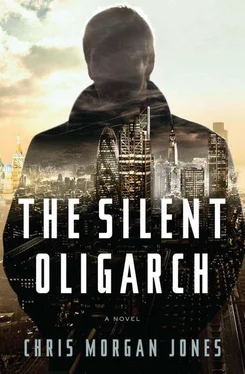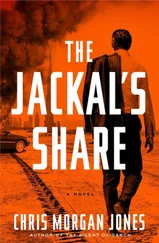IT WAS WEDNESDAY and Gerstman had been dead for three days. Webster had gone to the office but had done little work, and nothing at all on Project Snowdrop. There were a few small cases that needed his attention: a client was buying a ball-bearing manufacturer in the Czech Republic and wanted to know what he was getting; another was wondering why the manager of its Kiev business was losing so much money (because he had been stealing it himself, was the eventual answer). Webster checked on their progress, thanked providence that his team was so good, and spent the rest of the time in his office, thinking formless thoughts about his responsibilities to others and the risks of trying to improve the world. He felt betrayed by his suspicions, by his enthusiasm, but still his theory sat by him, stronger for Gerstman’s death, at once goading his powerlessness and tempting him to resume work. Hammer took him for lunch and tried to persuade him to turn his mind back to the case. His colleagues kept a distance.
That evening Webster went to the cinema with Elsa: Tokyo Story at The Tricycle. Afterward they ate at a Japanese restaurant in Hampstead, a tiny place where he and Elsa would sit at the counter to watch the chef at the hibachi. His hands, calloused and red with heat, moved with endless fluency, placing skewers of pork and chicken skin and quails’ eggs on the blackened grill, salting and turning them, knowing precisely when they were done. Webster looked at Elsa as she read the menu on the counter. In profile, her head bowed, she looked girlish. Her hair, so dark a brown that it was taken for black, not curled and not straight, hung about her face.
They ordered: some skewers, some sushi, sea bream and mackerel with salt. Sake came in square wooden cups with more salt. They touched them together and drank.
“How was lunch?” said Elsa.
“Good. We went to that dreadful Indian he likes.”
She laughed. “Empty?”
“One other table. I don’t know how they survived before he found it.”
She turned on her chair so she was almost facing him. He continued to look down at his sake. “And what did he say?”
“You can probably guess.”
“Anything new?”
“Not really.”
“He wants you to go on?”
Webster nodded. “If I don’t, he will.” He turned to look at her. “There’s a lot at stake.”
“I thought you’d made up your mind.”
“I had.” Elsa didn’t respond. “He was very persuasive.”
“As always.”
He paused. “This isn’t like you.”
“What?”
“To be down on Ike.”
“I’m not down on Ike. You know I love Ike. But he wants different things from life.” She paused while a waitress brought two bowls of soup and set them down on the counter. “He doesn’t have children, for a start.”
Webster gave his soup a stir with his chopsticks. Bright little cubes of tofu swam about in the broth. He frowned, not understanding her. “Where does that come in?”
“I don’t want anyone throwing you off a roof.”
“That’s silly.”
“Two of you had a conversation in Berlin. A few weeks later one of you is dead. Why aren’t you a loose end?”
He laughed. “They don’t kill advisers. They never have. It’s too much trouble. And someone else would just pop up in my place.”
Elsa didn’t say anything. She looked down at the counter, played with her chopsticks.
He put his hand on her back. “Are you worried?”
“I don’t like it. I know you when you get like this. It’s better when you have a case you don’t like.”
“If I thought I was in danger I’d stop. But I’m not. Really. After what happened in Budapest there’s no way they’ll do anything to me. How would it look?”
“Would they care?”
“Perhaps not. But killing an Englishman’s a pain in the arse. The police actually investigate. They’re not used to it.”
More food came. Elsa took a skewer and began to push the meat onto her plate with her chopsticks.
Without looking at him she said, “Don’t you think you should stop?”
“Yes and no.”
“For decency’s sake.”
He hesitated. “I found an article that Inessa wrote about him. Two months before she died. I never knew about it.”
“So?”
“With him it all makes sense. He had enough to lose. And friends all over government. He could have done it.”
“You think he killed Inessa?”
“He’s a candidate.”
Elsa shook her head and sighed. “This is new. But familiar.”
“It’s not important, in a way.” He watched her raise her eyebrows in response. “I know I’m never going to know. It’s not a crusade.”
“No. It’s a quest. For some sort of absolution.”
“I shouldn’t have just left. You know I regret that.”
“They threw you out.”
“I mean Russia.”
Elsa nodded. “So this is about justice.”
Webster could feel his ground crumbling. “I don’t know.”
“You attack the big Russian and hope he was responsible.”
“He deserves it anyway. And what if he was? It looks like he’s capable of it.”
“What if he wasn’t? What do you have? An article and a hunch?”
“If he goes down, things will come out,” he said. “He won’t be protected anymore. It could all come out.”
“And how likely is that?”
Webster was quiet. One of the things he loved about Elsa, but didn’t always enjoy, was that she allowed him no space to deceive himself. Only in this respect did her work spill over into their lives. She was a psychologist who worked with families, and her commitment to honesty never waned.
A waitress came to clear their bowls and asked if they would like more sake. Elsa smiled distractedly and politely told her no.
“Sweetheart,” she said, leaning in to him and resting her hand on his arm, “you don’t owe him anything. Gerstman. Just like Inessa. Ike’s right about that.”
“I think I do.” He picked up his cup, saw it was empty and set it down again. “It would be nice if someone was held to account. Just once. If not for Inessa then for everyone else.”
Elsa said nothing. He went on. “Look, I’m going to go to Berlin and see his widow. I have to. And then I see the client next week. He may put a stop to it in any case. We haven’t gotten very far.”
Elsa nodded slowly. “OK. OK.” She looked him in the eye. “But you have to promise me that if it gets worse, you stop. If you think even for a second that you’re in danger, you tell me, and you stop.”
He smiled. “Of course.”
“I’m serious, Ben.”
“I know. I love you for it.”
She laughed, relenting, shook her head, and looked around for the waitress. “We need another drink.” She turned back to him. “Wouldn’t it be nice to be a baker, or a gardener, or a bank manager? Don’t you think? Something simple?”
“I’ve been thinking just that. All week.”
NINA’S STREET WAS NARROW for Berlin, the buildings tall, and dotted along it were a handful of discreetly expensive shops. You had to look carefully, thought Webster, to realize just how exclusive a neighborhood this was; not showy, but solid, and moneyed. Webster paid his driver, found number 23 and posted the letter through Nina’s letterbox. He had little to do now except wait. He decided to walk back to the hotel. In a few minutes the arbitration hearing will begin in Paris, he thought, and wondered whether he should be there.
This time he took in the city. The day was cold and icy gray and cast a dull, even light over the wide streets. He walked from Charlottenburg, where the wealthy lived in their town houses, through the old western center, shabby now, a mess of trams and cars and roadworks, and up to the Tiergarten, where the silver birches had lost all their leaves and reminded him of Russia, of walking in Izmailovsky Park with Inessa and her friends. She would have come here, he thought; she would have seen Nina. Inessa had never knowingly left a story unfinished.
Читать дальше












